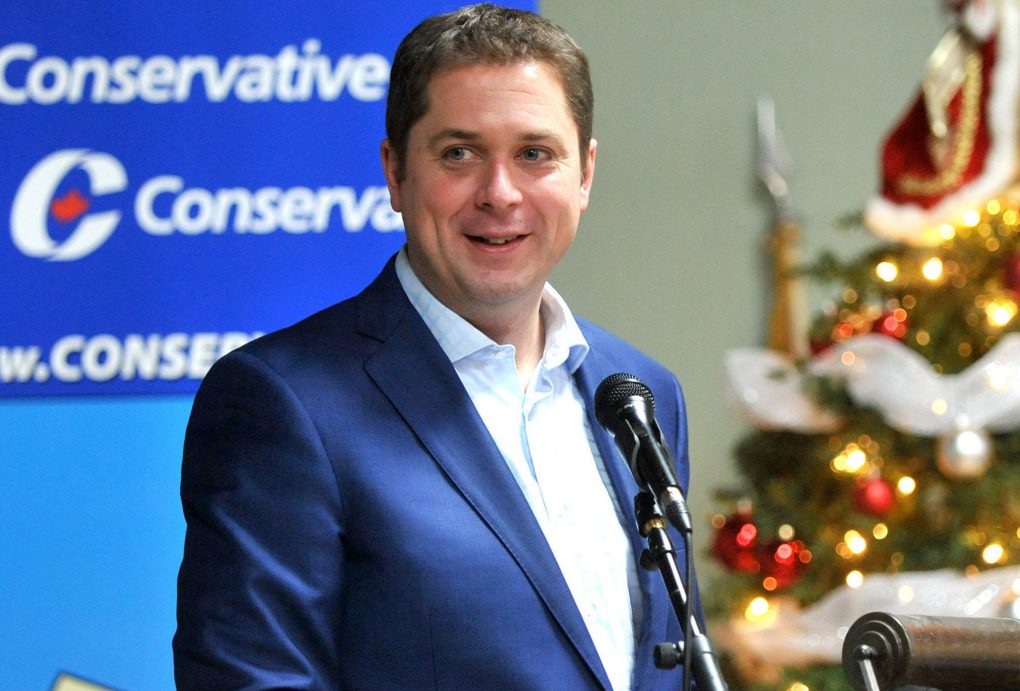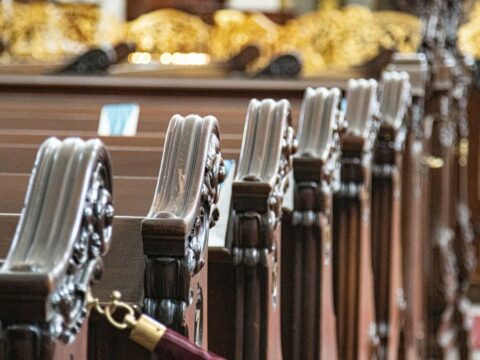Conservative Leader Andrew Scheer’s inability to clearly communicate his stances on same-sex marriage and abortion caused him a lot of trouble during the last federal election campaign, and a new poll shows that it may have also affected public perception of the Catholic politician.
Twice as many Canadians in a new online survey reported that what they had seen, heard or read about Scheer’s religious beliefs negatively impacted their views of him, as compared to NDP Leader Jagmeet Singh, who has also been vocal about his Sikh faith. Thirty-six percent said coverage of Prime Minister Justin Trudeau’s faith (he’s also Catholic) negatively affected their opinion of him, and 31 per cent said so of then-Green Party Leader Elizabeth May, who is a practicing Anglican.
You may unsubscribe from any of our newsletters at any time.
The results are part of new Angus Reid Institute public opinion research, carried out in partnership with Cardus, on the intersection of political leadership and faith. Angus Reid used a randomized sample of 2,057 Canadian adults who belong to the online Angus Reid Forum.
Survey respondents were asked whether or not they would believe a leader’s assertion that their religious views on an issue like abortion would not influence their policy making. The question did not reference any particular politician, although many likely thought of the opposition leader when answering, as he made similar statements during the campaign.
Nearly 70 percent said they would either have doubts about such a statement, or wouldn’t believe the leader at all, while 32 percent said they would believe them.
Shachi Kurl, Angus Reid’s executive director, said she has noticed a lot of discussion since Oct. 21 about whether a leader who is also a person of faith is actually electable.
“And in the wake of the campaign — the bedeviling campaign problems that Andrew Scheer had — I’ve heard journalists, I’ve heard policy makers, I’ve heard others say that this is a war on religion, this is a war on Catholicism, this is a war on conservative religion or orthodoxy, and I think what the data shows is that that is not necessarily the case,” she said.
More on Broadview: Kathleen Wynne on her faith after the election
“It has more to do with how a leader really manages to square the circle between their own personal faith and addressing Canadians on the issue of how that will or will not play into their shaping of policy.”
In a summary of the findings, Angus Reid noted that Canada has recently elected other Christian prime ministers who were not necessarily pro-choice. Jean Chretien, a Catholic, was not always in favour of full abortion and same-sex marriage rights, he told The Canadian Press in 2017, even though he helped pave the way for same-sex marriage’s legality in 2005.
Stephen Harper, an evangelical Christian, refused to reopen the abortion debate while in office, but in 2010, also ensured that Canada would not support foreign-aid work that involved abortion.
Regardless of their beliefs on same-sex marriage and abortion, the vast majority of survey respondents said that a leader’s stance on these issues would influence their vote, with it either having a “huge impact” or an “important impact, among other factors.” Women between the ages of 18-34 were the largest category to say that it would influence their vote.
Most of the respondents said they were either “spiritually uncertain,” “privately faithful” or “religiously committed,” while more than half identified as either Roman Catholic or Mainline Protestant. Kurl said the reported religious identity of the survey respondents reflected Statistics Canada data.
She told Broadview that while the organization has previously polled Canadians on their own private spirituality and their thoughts on faith in the public sphere, our “unique” federal election sparked their interest in this topic.
“I’ve heard others say that this is a war on religion, this is a war on Catholicism, this is a war on conservative religion or orthodoxy, and I think what the data shows is that that is not necessarily the case.”
“It was an election that started out with many presuming it would be a referendum about Justin Trudeau, but the ballot question ended up being about Andrew Scheer,” she said.
Respondents were asked for their thoughts on freedom of religion as well. A majority (62 percent) said they thought that freedom of religion improves Canada, while 12 percent said it worsens our country.
The survey also solicited Canadians’ opinions about religion’s part in public life. Thirty-six percent were categorized as “public faith proponents,” those who think religion matters in society and want to boost public understanding of faith, while 32 percent were classified as “public faith opponents,” those who would like religion to have less of a role in government and politics. A final third were mixed.
“I think that this study actually debunks quite a bit of the narrative that both sides in this conversation would like to put forward. The public faith opponents would like to make the case that Canada is very, very secular and non-religious, and that Canadians are not a religious [people] and they don’t have use or time for faith,” Kurl said.
“That’s not the case based on these findings. At the same time, there are those who would say, freedom of religion is a proxy for desire to see more faith in the public square, more intersection between governance and faith and government and faith, and Canadians are quite divided on that issue.”
Angus Reid said that for comparison, a probability sample of this size would carry a margin of error of +/- 2.0 percentage points, 19 times out of 20.
Broadview is an award-winning progressive Christian magazine, featuring stories about spirituality, justice and ethical living. For more of our content, subscribe to the magazine today.














Leaving out the issues of ones stance in hotly debated questions. Where would you like to live: in a country that has been established by Judaeo-Christian values, or in one established by other faiths or humanistic values?
I thought so.
Your article is timely given the reporter’s question to Andrew Sheer a few weeks ago. A reasonable and balanced answer that PM Sheer might consider giving next time if he intends to lead in a pluralistic democracy is best given int he context of our Charter of Rights and Freedoms. The preamble of the Charter sets a says “Canada is founded upon principles that recognize the supremacy of God and the rule of law”. On this foundation is built the pillars of the superstructure which is the principle of freedom- freedom of religion, freedom of conscience, freedom of expression (of conscience). In this context, the church would be prudent to remember Supreme Court Justice Gonthier’s dissenting opinion over a charter challenge of freedom eof religion (Chamberlain vs Surrey School District, 2002). “ …nothing in the Charter, political or democratic theory, or a proper understanding of pluralism demands that atheistically based moral positions trump religiously based moral positions on matters of public policy… “To construe “secular” as the realm of the ‘unbelief’ is therefore erroneous. Given this, why, then, should the religiously informed conscience be placed at public disadvantage or disqualification? To do so would be to distort liberal principles in an illiberal fashion and would provide only a feeble notion of pluralism”.
Your article reminds me that Canadians have an intuition that this is not about religion per se. It is however a question vital to pluralistic democracy. Every MP and church leader regardless of party or world view would be wise to defend the principle of Scheer’s freedom to believe and expression.